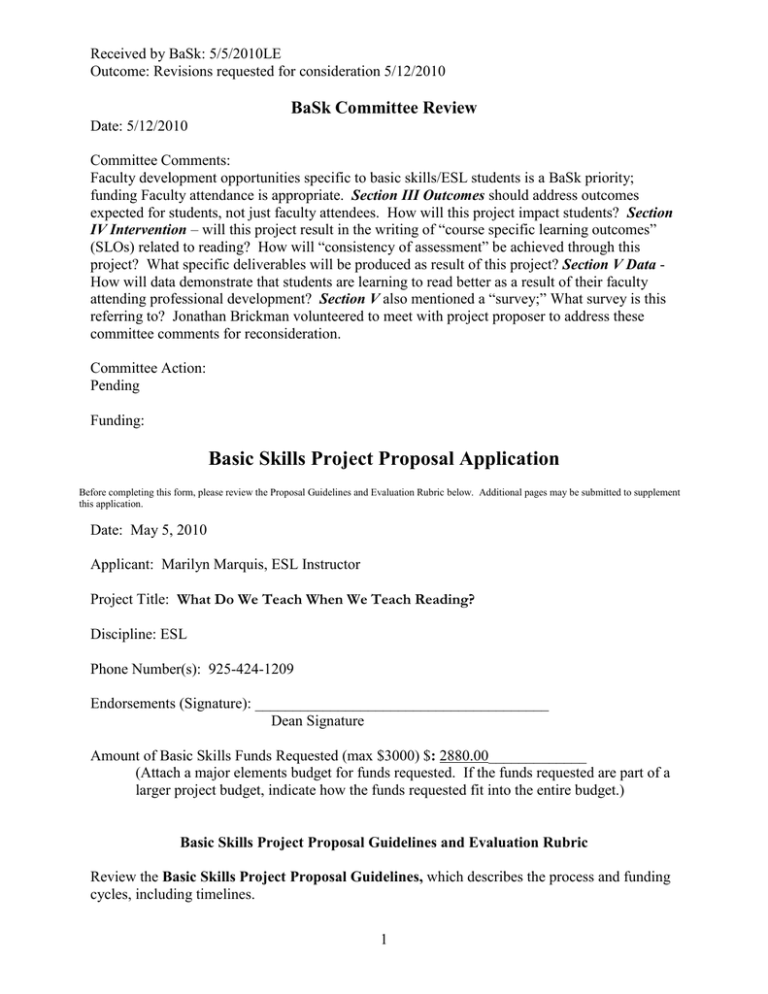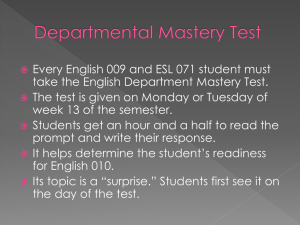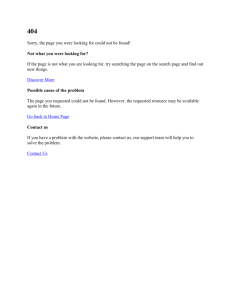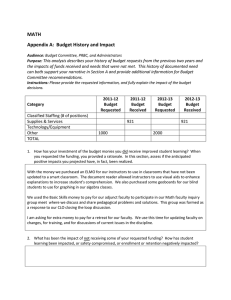BaSk Committee Review
advertisement

Received by BaSk: 5/5/2010LE Outcome: Revisions requested for consideration 5/12/2010 BaSk Committee Review Date: 5/12/2010 Committee Comments: Faculty development opportunities specific to basic skills/ESL students is a BaSk priority; funding Faculty attendance is appropriate. Section III Outcomes should address outcomes expected for students, not just faculty attendees. How will this project impact students? Section IV Intervention – will this project result in the writing of “course specific learning outcomes” (SLOs) related to reading? How will “consistency of assessment” be achieved through this project? What specific deliverables will be produced as result of this project? Section V Data How will data demonstrate that students are learning to read better as a result of their faculty attending professional development? Section V also mentioned a “survey;” What survey is this referring to? Jonathan Brickman volunteered to meet with project proposer to address these committee comments for reconsideration. Committee Action: Pending Funding: Basic Skills Project Proposal Application Before completing this form, please review the Proposal Guidelines and Evaluation Rubric below. Additional pages may be submitted to supplement this application. Date: May 5, 2010 Applicant: Marilyn Marquis, ESL Instructor Project Title: What Do We Teach When We Teach Reading? Discipline: ESL Phone Number(s): 925-424-1209 Endorsements (Signature): _______________________________________ Dean Signature Amount of Basic Skills Funds Requested (max $3000) $: 2880.00_____________ (Attach a major elements budget for funds requested. If the funds requested are part of a larger project budget, indicate how the funds requested fit into the entire budget.) Basic Skills Project Proposal Guidelines and Evaluation Rubric Review the Basic Skills Project Proposal Guidelines, which describes the process and funding cycles, including timelines. 1 Received by BaSk: 5/5/2010LE Outcome: Revisions requested for consideration 5/12/2010 Consider the Basic Skills Project Proposal Rubric, which the committee will use to evaluate your proposal, when preparing your application. I. Description of Proposed Activity: How will BSI funds be used? Background This project is designed to encourage reflective and effective reading instruction. The aim is to examine attitudes, beliefs, and assumptions about what we teach when we teach reading and to align those with our teaching practice and with the theories of second language reading acquisition. At the conclusion of each workshop, participants will engage in critical reflection through asking questions and discussing how individual attitudes, beliefs, assumptions, and practices influence reading instruction. The BSI funds for this project will be used to pay instructors to attend three sequential workshops and to pay the presenter for developing the material for the workshops. The project will consist of three two hour workshops for ESL instructors, plus a one hour meeting at the end of the semester to evaluate the results of the workshops. At the first workshop participants will discuss reading comprehension and identify effective methods of instruction: Rapid, automatic, accurate work recognition Vocabulary knowledge Syntactic knowledge Reading strategies At the second workshop participants will evaluate the components of effective reading instruction and develop strategies for including those components into their teaching practice: Promote word recognition skills Build a large sight vocabulary Practice comprehension skills promote reading fluency and flexibility Promote extensive reading Develop motivation At the third workshop participants will examine the purposes of assessment in developing reading proficiency and identify some types of assessment for each purpose: Assess classroom learning from an individual lesson/assignment Assess classroom learning from a series of lessons/assignments Assess classroom learning over the semester of instruction Assess individual student learning Assess curricular effectiveness 2 Received by BaSk: 5/5/2010LE Outcome: Revisions requested for consideration 5/12/2010 Participants will meet for one hour during finals week to evaluate the influence these workshops have had on their teaching practice. They will complete a survey that measures how their attitudes, beliefs, assumptions, and practices have changed as a result of participating in the project. II. Goals One goal of this project is to heighten teacher awareness of the theories and best practices of second language reading instruction so that students will have access to efficient and effective learning opportunities. Another goal is to motivate instructors to reflect on their teaching philosophy and to align their attitudes, beliefs, assumptions, and teaching practice to the theories and best practices. A third goal is to provide instructors with an opportunity to engage in critical reflection with their colleagues and thus build professional relationships that motivate collaboration. The ESL program is sequential, so it is imperative for instructors to work systematically to engage students in tasks that promote learning and practicing. A community of instructors provides students with a model for becoming a community of learners. A final goal is to highlight the importance of consistency in assessment and to begin the process of developing reading final exams for each level of instruction in the ESL program. These goals are consistent with and support the goals of the Basic Skills Committee. III. Outcomes: Tangible results expected from the proposed project. Participants will know what reading comprehension is and identify some effective methods for helping students develop reading comprehension skills at specific reading levels. Participants will be able to identify some components of effective reading instruction and identify some strategies that they can incorporate into their teaching practice. Workshop participants will be able to identify purposes and types of reading assessment and identify some types of assessment that they can incorporate into their teaching practice. Workshop participants will recognize the importance of a program wide final reading exam for each level of ESL proficiency level. The outcomes will be assessed after each workshop. For example, the participants will identity important components of reading comprehension and develop methods for teaching rapid, automatic, accurate work recognition, for developing vocabulary knowledge, for enhancing syntactic knowledge and for practicing reading strategies. Participants will have a set of strategies that promote word recognition skills, build a large sight vocabulary, provide practice in using comprehension skills, promote reading fluency and flexibility, promote extensive reading, and increase student motivation. Participants will be able to use different types of reading assessment according to their purpose. 3 Received by BaSk: 5/5/2010LE Outcome: Revisions requested for consideration 5/12/2010 Participants will be able to articulate what they do when they teach reading. They will be able to identify how their attitudes, beliefs, assumptions, and practices have changed as a result of participating in the project. IV. Intervention: Treatment(s) students will receive. And how many students will be affected? (Where and when are the points of contact with students?) Students will be affected by this project in numerous ways. First, critical reflection promotes planning, evaluation, and curriculum decisions; all of which affect student learning and effective classroom teaching. Second, the discussion and analysis that follow the reflections promote changes at the assignment, syllabus, course, and program level. These changes over time will improve reading instruction and result in greater gains in reading development. Third, student learning outcomes, assessment, and change are important components of the college commitment to improving teaching and learning. Through a deeper understanding of what we should be teaching when we teach reading, instructors will be able to identify appropriate outcomes for their lessons and courses. Finally, the project will lead to consistency in developing course specific final exams and course specific learning outcomes. All students in the ESL program will be affected by effective and efficient reading instruction. Consistency of assessment promotes student learning and ensures student self-confidence and in the program-confidence. V. Timeline: Describe the timeline of your project, including when the various aspects of your project (such as planning, implementation and evaluation) will occur. The planning for this project will begin in fall 2010. The workshops will take place in the spring 2011 semester: one in January, one in February, and one in March. The reflection will take place throughout the semester. The final meeting and evaluation will take place during finals week on the day of the writing holistic scoring. VI. Data: What data will demonstrate intended outcomes? What data is the project/ program already collecting? The results of the survey will inform the revision of curriculum, the development of reading student learning outcomes, and lead to a bank of reading assessments that can be shared among the instructors at different levels of proficiency. Major Elements Budget: The amount requested is $2880.00. This will provide a stipend of $180.00 to each of 15 participants and an additional stipend of $180.00 for planning and implementing. 4


